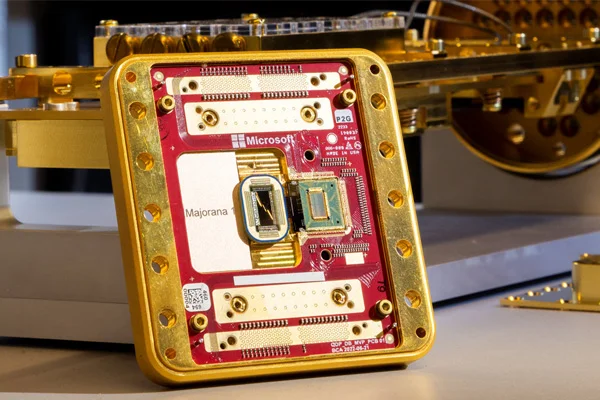violetcyber projects
Microsoft’s new quantum processor Majorana 1
Introducing Microsoft’s Quantum Processor: Majorana 1
Microsoft has unveiled its latest breakthrough in quantum computing: the Majorana 1 processor. This new quantum chip is based on topological qubits, leveraging Majorana particles—exotic quantum states that promise greater stability and lower error rates compared to traditional qubits.
What Makes Majorana 1 Special?
Unlike conventional quantum processors that suffer from high decoherence rates, Majorana 1 is designed to be more robust, allowing for scalable quantum computing with significantly reduced noise. The processor is built using a novel approach that enables it to potentially scale up to one million qubits, making it a major leap toward practical quantum computing.
The Science Behind It
The core innovation of Majorana 1 lies in Majorana zero modes, a type of quasiparticle predicted by the Italian physicist Ettore Majorana in 1937. These particles exhibit non-Abelian braiding properties, which means they can encode quantum information in a way that is highly resistant to external interference—one of the biggest challenges in quantum computing.
Potential Applications
With its enhanced stability and scalability, Majorana 1 has the potential to revolutionize various fields, including:
- Cryptography: Developing unbreakable encryption methods.
- Drug Discovery: Simulating complex molecules for pharmaceutical research.
- Artificial Intelligence: Accelerating machine learning and optimization tasks.
- Material Science: Designing next-generation materials with atomic-level precision.
The Future of Quantum Computing
While Microsoft’s announcement is a significant step forward, the field of quantum computing is still in its early stages. More testing and real-world applications will determine how well Majorana 1 performs compared to other quantum architectures, such as superconducting qubits used by Google and IBM.
This breakthrough brings us closer to a future where quantum computers can solve problems beyond the reach of classical systems. If successful, Microsoft’s Majorana 1 could play a crucial role in shaping the next era of computation.
But what does this new Microsoft processor have to do with VioletCyber’s projects?
We have been working on interplanetary internet technology for a long time. If you have studied current internet communications and methods of controlling robots on other planets, you know that all these systems rely on electromagnetic waves—which, after all, are a frequency of light. This means they are limited to the speed of light.
The fundamental problem is that due to the speed limitations of electromagnetic waves, we cannot establish an Earth-like internet network between planets such as Earth and Mars. This is because data transmission to and from Mars takes around 40 minutes.
Imagine clicking the download button and then waiting 40 minutes for it to start—pretty frustrating, right?
That’s why we are working on a project called Quantum-Based Interplanetary Internet, leveraging quantum entanglement to revolutionize communications. This could enable a high-speed, efficient interplanetary internet system, eliminating concerns about the vast distances between planets.
We all know that Elon Musk’s ambitious SpaceX projects will soon become a reality, and we will witness the emergence of cities on Mars. At that point, the need for a cosmic and interplanetary internet will be more critical than ever. That’s why we must start preparing today—and VioletCyber has already begun working on this project.
One of the biggest challenges in building a quantum internet network is that quantum particles are extremely sensitive to environmental noise, especially in space, where they are exposed to cosmic radiation. We are exploring ways to design and develop quantum chips that can withstand such interference, taking significant steps toward making interplanetary internet a reality.
With Microsoft unveiling a quantum processor resistant to environmental noise, there is renewed hope that we can develop quantum chips and components capable of leveraging quantum mechanics for communication.
According to VioletCyber’s roadmap, deploying quantum interplanetary internet networks requires nodes and orbital satellites equipped with quantum processors and chips. These satellite chips must be immune to solar and cosmic radiation to function effectively in space.
With the development of such processors, we can expect the first prototypes of quantum satellites for interplanetary internet to emerge soon—and VioletCyber will be one of the key pioneers of this project.
VioletCyber is planning to collaborate with Microsoft on this interplanetary internet project, and the company’s senior executives are currently preparing for negotiations with Microsoft.

